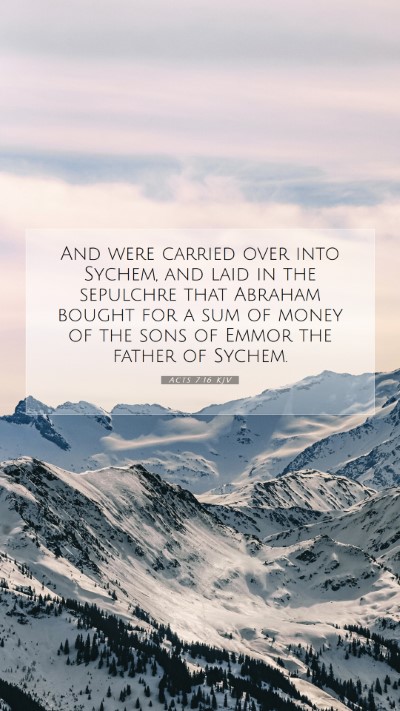Understanding Acts 7:16
Bible Verse: Acts 7:16 - "And were carried over into Sychem, and laid in the sepulchre that Abraham bought for a sum of money of the sons of Emmor the father of Sychem."
Introduction
Acts 7:16 is a crucial verse in understanding the early church's reflection on Old Testament history, especially concerning the patriarchs and the land of promise. This verse provides a connection to the Abrahamic covenant and highlights the importance of the land in God's promises to His people. Below, we will explore the meaning of this Bible verse using insights from public domain commentaries.
Bible Verse Meanings and Commentary
Contextual Background
The context of this verse is found in Stephen's defense before the Sanhedrin. He recounts the history of Israel from Abraham to Moses, emphasizing God's providence and the rejection of God's messengers by the people. This verse serves to illustrate the faithfulness of God to His promises, even amidst the struggles of His people.
Matthew Henry's Commentary
According to Matthew Henry, this verse underscores the fulfillment of God's promises to Abraham. The mention of Sychem indicates a significant location in the history of Israel, representing both the inheritance and the contentious relationship the people had regarding the land. Henry points out that Abraham's purchase of the sepulcher signifies legitimate claim and hope for future generations in the Divine plan.
Albert Barnes' Interpretation
Albert Barnes notes that the phrase “carried over into Sychem” highlights a transition, emphasizing not just geography but also the spiritual journey of the Israelites. He connects this to the greater narrative of possession—the land that was not just promised but purchased, highlighting Abraham's faith in God's promises. Barnes stresses the idea of securing a place for the future, as the sepulchre symbolizes Abraham's faith in resurrection and permanence.
Adam Clarke's Exegesis
Adam Clarke elaborates on the significance of the sepulcher, explaining its role as a token of the covenant between God and Abraham. Clarke emphasizes that this act of purchase is noteworthy as it demonstrates an actual investment in the land despite the current sojourning status of the Israelites. He also points out how this historical act would eventually outline the narrative of God's people dwelling in the land, reflecting both physical and spiritual implications.
Spiritual and Theological Implications
This verse is not merely a historical account but serves as a profound reminder of God’s enduring promises. The themes of faith, legacy, and divine assurance resonate throughout Scripture and reflect God’s providential care. The sepulcher serves as a landmark of hope amidst a journey of trials, suggesting a deeper application for believers today.
Significance of the Sepulcher
The sepulcher represents both a memorial to Abraham and an assurance of the covenant promise. It is a potent symbol of how God does not only promise but also provides tangible markers of faith throughout the history of His people. This aspect invites us to consider how markers of faith in our lives can remind us of God’s promises.
Application for Today's Believers
For modern believers, Acts 7:16 encourages thoughtful reflection on the importance of legacy, faith, and the historical workings of God in our lives. It challenges us to consider how we claim our spiritual inheritance and what markers we establish in our faith journeys. This verse also reinforces community and individual identity within the larger narrative of God’s family.
Related Bible Cross References
- Genesis 12:6-7 - The promise to Abraham concerning the land.
- Genesis 33:18-20 - The mention of the land of Sychem and the burial site.
- Hebrews 11:8-10 - Abraham's faith in the promises of God concerning the land.
- Joshua 24:32 - The fulfillment of the promise regarding the tomb of Abraham.
- Galatians 3:29 - The inheritance of all believers as children of Abraham.
- John 4:5 - Sychem's significance in the New Testament.
Conclusion
Acts 7:16 serves as both a historical account and a theological reflection on the promises of God. By understanding the meaning of this Bible verse, we gain insight into the broader narrative of Scripture and how God's promises unfold in both the Old and New Testaments. The reflections offered by prominent commentaries reveal a depth that invites further exploration and integration into our faith practice, enhancing our Bible study insights.
Further Study and Reflection
As you explore Acts 7:16 and its related passages, consider joining a Bible study group or utilizing Bible study resources to deepen your understanding. Engage with the text through online Bible study, using various Bible study tools available or even taking Bible study courses to enhance your knowledge and spiritual journey.


